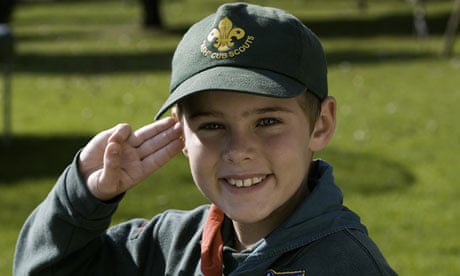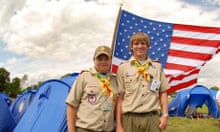Since 1908, when Robert Baden-Powell laid down the rules for his nascent movement in Scouting for Boys, new Scouts and Guides have made the traditional three-finger salute and promised to not just help others but remain loyal to a deity or higher power. Now, for the first time, the self-professed godless could also be welcome.
The Scout Association has launched a consultation to gauge support among members for an alternate atheist Scout promise, removing the invocation of a deity. At the same time, the Guide Association, the parallel movement which began two years later, is to launch a consultation about its very similar promise, with views sought on all parts of the wording from early January.
The current version of the Scout promise reads: "On my honour, I promise that I will do my best to do my duty to God and to the Queen, to help other people and to keep the Scout law."
The reference to God is deemed usable for most religions, although there have been options – such as Allah for Muslims or "my Dharma" for Buddhists – for more than 40 years. Those in other countries promise duty to their own nation or monarch.
But there has been no non-religious equivalent for either Scouts or Guides, meaning young atheists have had to either had to fudge the promise or forgo the woggle.
Secular groups have campaigned for change, highlighting cases such as that of 11-year-old George Pratt, who had been scouting for almost a year but was unable to join when officially invited as he felt unable to make a pledge to God.
The Scout Association, which began admitting girls in 1976, is indicating it would favour a change.
Wayne Bulpitt, its UK chief commissioner, said religion would remain "a key element" even if a new variant of the promise was approved. He added: "However, throughout our 105-year history, we have continued to evolve so that we remain relevant to communities across the UK. "
Julie Bentley, chief executive of the Guide Association, said its consultation would begin on 3 January. "It's something our board has been planning to do for some time," she added.
The news was welcomed by secular campaigners. Terry Sanderson, president of the National Secular Society, said the change would bring the Scouts "in line with the reality of 21st-century Britain, where more than two thirds of young people say they have no religious belief".
Atheist or not, all new Scouts and Guides must still promise to adhere to their respective laws, including for the former that they "make good use of time and are careful of possessions and property" and "have courage in all difficulties".




Comments (…)
Sign in or create your Guardian account to join the discussion